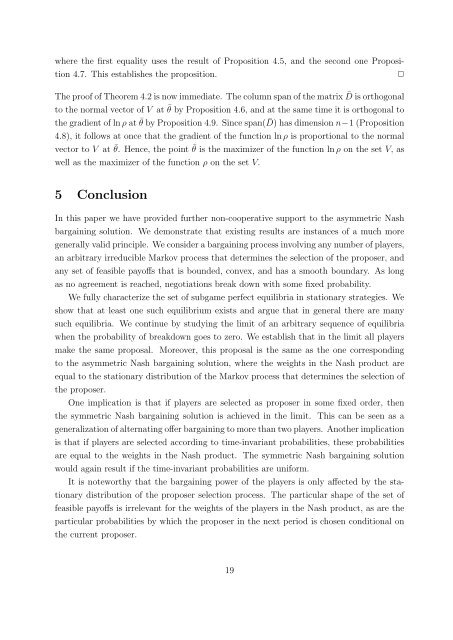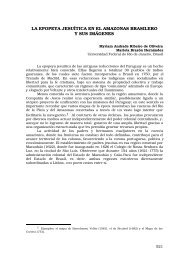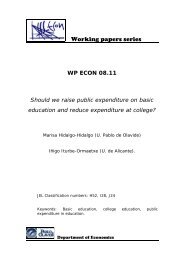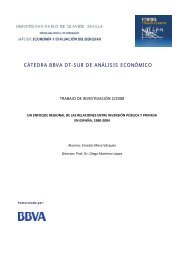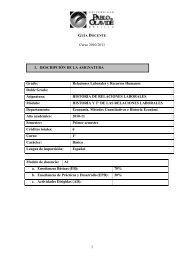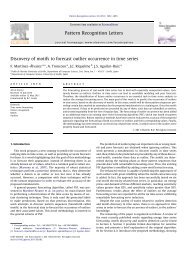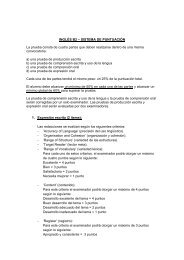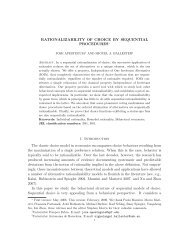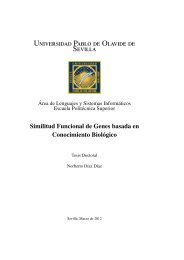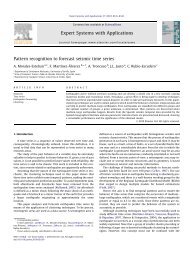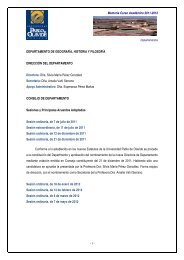Non-cooperative Support for the Asymmetric Nash Bargaining Solution
Non-cooperative Support for the Asymmetric Nash Bargaining Solution
Non-cooperative Support for the Asymmetric Nash Bargaining Solution
Create successful ePaper yourself
Turn your PDF publications into a flip-book with our unique Google optimized e-Paper software.
where <strong>the</strong> first equality uses <strong>the</strong> result of Proposition 4.5, and <strong>the</strong> second one Proposition4.7. This establishes <strong>the</strong> proposition.✷The proof of Theorem 4.2 is now immediate. The column span of <strong>the</strong> matrix ¯D is orthogonalto <strong>the</strong> normal vector of V at ¯θ by Proposition 4.6, and at <strong>the</strong> same time it is orthogonal to<strong>the</strong> gradient of ln ρ at ¯θ by Proposition 4.9. Since span( ¯D) has dimension n−1 (Proposition4.8), it follows at once that <strong>the</strong> gradient of <strong>the</strong> function ln ρ is proportional to <strong>the</strong> normalvector to V at ¯θ. Hence, <strong>the</strong> point ¯θ is <strong>the</strong> maximizer of <strong>the</strong> function ln ρ on <strong>the</strong> set V, aswell as <strong>the</strong> maximizer of <strong>the</strong> function ρ on <strong>the</strong> set V.5 ConclusionIn this paper we have provided fur<strong>the</strong>r non-<strong>cooperative</strong> support to <strong>the</strong> asymmetric <strong>Nash</strong>bargaining solution. We demonstrate that existing results are instances of a much moregenerally valid principle. We consider a bargaining process involving any number of players,an arbitrary irreducible Markov process that determines <strong>the</strong> selection of <strong>the</strong> proposer, andany set of feasible payoffs that is bounded, convex, and has a smooth boundary. As longas no agreement is reached, negotiations break down with some fixed probability.We fully characterize <strong>the</strong> set of subgame perfect equilibria in stationary strategies. Weshow that at least one such equilibrium exists and argue that in general <strong>the</strong>re are manysuch equilibria. We continue by studying <strong>the</strong> limit of an arbitrary sequence of equilibriawhen <strong>the</strong> probability of breakdown goes to zero. We establish that in <strong>the</strong> limit all playersmake <strong>the</strong> same proposal. Moreover, this proposal is <strong>the</strong> same as <strong>the</strong> one correspondingto <strong>the</strong> asymmetric <strong>Nash</strong> bargaining solution, where <strong>the</strong> weights in <strong>the</strong> <strong>Nash</strong> product areequal to <strong>the</strong> stationary distribution of <strong>the</strong> Markov process that determines <strong>the</strong> selection of<strong>the</strong> proposer.One implication is that if players are selected as proposer in some fixed order, <strong>the</strong>n<strong>the</strong> symmetric <strong>Nash</strong> bargaining solution is achieved in <strong>the</strong> limit. This can be seen as ageneralization of alternating offer bargaining to more than two players. Ano<strong>the</strong>r implicationis that if players are selected according to time-invariant probabilities, <strong>the</strong>se probabilitiesare equal to <strong>the</strong> weights in <strong>the</strong> <strong>Nash</strong> product. The symmetric <strong>Nash</strong> bargaining solutionwould again result if <strong>the</strong> time-invariant probabilities are uni<strong>for</strong>m.It is noteworthy that <strong>the</strong> bargaining power of <strong>the</strong> players is only affected by <strong>the</strong> stationarydistribution of <strong>the</strong> proposer selection process. The particular shape of <strong>the</strong> set offeasible payoffs is irrelevant <strong>for</strong> <strong>the</strong> weights of <strong>the</strong> players in <strong>the</strong> <strong>Nash</strong> product, as are <strong>the</strong>particular probabilities by which <strong>the</strong> proposer in <strong>the</strong> next period is chosen conditional on<strong>the</strong> current proposer.19


